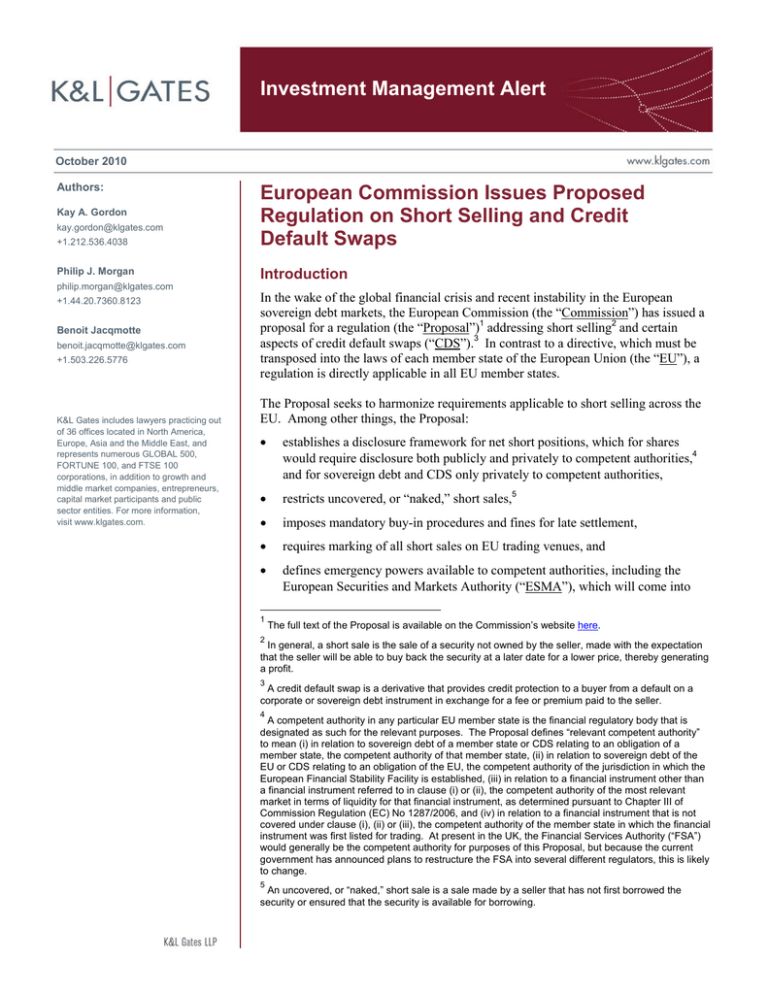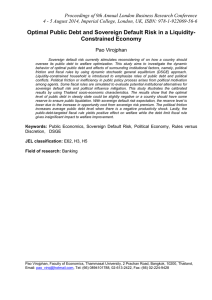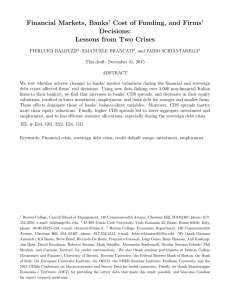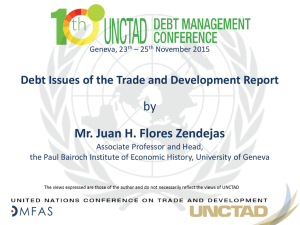
Investment Management Alert
October 2010
Authors:
Kay A. Gordon
kay.gordon@klgates.com
+1.212.536.4038
Philip J. Morgan
European Commission Issues Proposed
Regulation on Short Selling and Credit
Default Swaps
Introduction
philip.morgan@klgates.com
+1.44.20.7360.8123
Benoit Jacqmotte
benoit.jacqmotte@klgates.com
+1.503.226.5776
K&L Gates includes lawyers practicing out
of 36 offices located in North America,
Europe, Asia and the Middle East, and
represents numerous GLOBAL 500,
FORTUNE 100, and FTSE 100
corporations, in addition to growth and
middle market companies, entrepreneurs,
capital market participants and public
sector entities. For more information,
visit www.klgates.com.
In the wake of the global financial crisis and recent instability in the European
sovereign debt markets, the European Commission (the “Commission”) has issued a
proposal for a regulation (the “Proposal”)1 addressing short selling2 and certain
aspects of credit default swaps (“CDS”).3 In contrast to a directive, which must be
transposed into the laws of each member state of the European Union (the “EU”), a
regulation is directly applicable in all EU member states.
The Proposal seeks to harmonize requirements applicable to short selling across the
EU. Among other things, the Proposal:
•
establishes a disclosure framework for net short positions, which for shares
would require disclosure both publicly and privately to competent authorities,4
and for sovereign debt and CDS only privately to competent authorities,
•
restricts uncovered, or “naked,” short sales,5
•
imposes mandatory buy-in procedures and fines for late settlement,
•
requires marking of all short sales on EU trading venues, and
•
defines emergency powers available to competent authorities, including the
European Securities and Markets Authority (“ESMA”), which will come into
1
The full text of the Proposal is available on the Commission’s website here.
2
In general, a short sale is the sale of a security not owned by the seller, made with the expectation
that the seller will be able to buy back the security at a later date for a lower price, thereby generating
a profit.
3
A credit default swap is a derivative that provides credit protection to a buyer from a default on a
corporate or sovereign debt instrument in exchange for a fee or premium paid to the seller.
4
A competent authority in any particular EU member state is the financial regulatory body that is
designated as such for the relevant purposes. The Proposal defines “relevant competent authority”
to mean (i) in relation to sovereign debt of a member state or CDS relating to an obligation of a
member state, the competent authority of that member state, (ii) in relation to sovereign debt of the
EU or CDS relating to an obligation of the EU, the competent authority of the jurisdiction in which the
European Financial Stability Facility is established, (iii) in relation to a financial instrument other than
a financial instrument referred to in clause (i) or (ii), the competent authority of the most relevant
market in terms of liquidity for that financial instrument, as determined pursuant to Chapter III of
Commission Regulation (EC) No 1287/2006, and (iv) in relation to a financial instrument that is not
covered under clause (i), (ii) or (iii), the competent authority of the member state in which the financial
instrument was first listed for trading. At present in the UK, the Financial Services Authority (“FSA”)
would generally be the competent authority for purposes of this Proposal, but because the current
government has announced plans to restructure the FSA into several different regulators, this is likely
to change.
5
An uncovered, or “naked,” short sale is a sale made by a seller that has not first borrowed the
security or ensured that the security is available for borrowing.
Investment Management Alert
existence on January 1, 2011, to restrict or ban short
sales or CDS in exceptional circumstances.
The Proposal follows a period of public consultation
on short selling, including with an advisory group of
market participants and the EU Committee of
European Securities Regulators (“CESR”). In
particular, the Proposal builds on the approach for
harmonized disclosure and regulation of short
positions across Europe advocated by the CESR in
its report issued in March 2010.6
The Proposal must be considered and adopted both
by the EU Council of Ministers and the European
Parliament, which may implement substantial
changes during the process. The Proposal is
currently expected to take effect in July 2012,
although the EU legislative process may affect that
timeframe.
Summary of the Proposal
Scope
The Proposal would apply to the following financial
instruments:
(a) Financial instruments7 that are listed on a
trading venue (defined to include, in general,
regulated markets and multilateral trading
facilities) in the EU, including such instruments
when traded outside a trading venue,
(b) Derivatives8 that relate to a financial instrument
referred to in clause (a) or an issuer of such a
financial instrument, including such derivatives
when traded outside a trading venue, and
(c) Debt instruments issued by a member state or
the EU and derivatives that relate to such debt
6
For further information regarding this report, please see our
March 2010 Client Alert titled “New Regulatory Approaches to
Short Selling in the U.S. and the EU,” available here.
7
The term “financial instrument,” incorporated from Annex I,
Section C of the Markets in Financial Instruments Directive
(Directive 2004/39/EC) (“MiFID”), is broadly defined to include
securities, options, futures, swaps, derivatives and similar
instruments.
8
For this purpose, “derivatives” refers to those derivatives set
out in Annex I, Section C, points (4) to (10) of MiFID and
includes a broad range of options, futures, swaps, forwards
and other derivative instruments.
instruments issued by, or to an obligation of, a
member state or the EU.
Calculation of Short and Long Positions
The Proposal broadly defines a short position
relating to the issued share capital of a company or
issued sovereign debt of a member state or the EU
(including for this purpose any CDS that relates to
an obligation or credit event relating to a member
state or the EU) to include:
(a) any short sale of a share issued by a company or
sovereign debt instrument issued by a member
state or the EU, and
(b) an individual or entity entering into any
transaction relating to any other financial
instrument that confers a financial advantage on
such individual or entity if the value of the
share or sovereign debt instrument decreases.
Conversely, a long position is defined to include
(i) holding a share issued by a company or
sovereign debt instrument issued by a member state
or the EU and (ii) an individual or entity entering
into any transaction relating to any other financial
instrument that confers a financial advantage to
such individual or entity if the value of the share or
sovereign debt instrument increases.
Under the Proposal, long and short positions in
relation to the issued share capital of a company and
in relation to the issued sovereign debt of a member
state or the EU are netted against each other and,
with respect to sovereign debt, are calculated
separately for each member state or the EU even if
separate entities within the member state or the EU
issues debt on its behalf. In addition, an individual
or entity’s CDS position relating to an obligation of
a member state or the EU is deemed to be
uncovered9 if the CDS does not serve to hedge
against the risk of default on the individual or
entity’s long position in the sovereign debt of the
same issuer (or any other long position in the debt
9
Under the Proposal, uncovered positions in CDS relating to
an obligation of a member state or the EU would be subject to
the notification and disclosure requirements described below
under “Disclosures of Significant Net Short Positions” and
would be subject to any limitations imposed by competent
authorities and ESMA described below under “Powers of
Intervention of Competent Authorities and ESMA.”
October 2010
2
Investment Management Alert
of an issuer for which the price is highly correlated
with the price of the obligation of the member state
or the EU).
The Commission would be required to adopt
measures specifying the manner in which long and
short positions will be calculated, including the
method of calculating positions for fund
management activities related to separate funds.
Due to the very broad nature of the Proposal’s scope
and calculation provisions, a wide range of financial
positions that provide individuals and entities with
net short exposure in relation to the issued share
capital of companies and the issued sovereign debt
of member states and the EU would be subject to the
Proposal’s disclosure, uncovered short sale, buy-in,
emergency and other provisions.
The Commission would be empowered to modify
the foregoing thresholds to take into account market
developments. In addition, trading venues on which
shares are listed would be required to (i) establish
procedures to ensure that short sales are marked as
such and (ii) publish at least daily a summary of the
volume of orders entered as short sales.
Net short positions in relation to sovereign debt
and uncovered positions in relation to CDS:
•
An individual or entity with (i) a net short
position relating to the issued sovereign debt of
a member state or the EU (sometimes referred
to herein as a “net short position in relation to
sovereign debt”), or (ii) an uncovered position
in CDS relating to an obligation of a member
state or the EU (sometimes referred to herein as
an “uncovered position in relation to CDS”),
would have to notify the relevant competent
authority whenever any such position reaches,
or falls below, a relevant notification threshold
for the applicable member state or the EU.
•
The Commission would be charged with
establishing initial and additional incremental
notification thresholds in relation to each
member state and the EU, taking into account,
among other things, the total value of
outstanding issued sovereign debt for each
member state and the EU and the average size
of positions held by market participants holding
such debt.
Disclosures of Significant Net Short
Positions
Individuals and entities inside and outside of the EU
that hold certain net short positions in relation to
shares, sovereign debt and CDS would, under the
Proposal, be subject to the following notification and
disclosure requirements:
Net short positions in relation to shares:
•
An individual or entity with a net short position
in relation to the issued share capital of a
company that has shares listed on a trading
venue (sometimes referred to herein as a “net
short position in relation to shares”) would have
to notify the relevant competent authority
whenever the net short position reaches, or falls
below, 0.2% of the value of the issued share
capital of the company concerned.
•
An individual or entity with a net short position
in relation to shares would have to disclose such
position to the public whenever the position
reaches, or falls below, 0.5% of the value of the
issued share capital of the company concerned.
•
Each additional change in a net short position in
relation to shares in the amount of 0.1% of the
value of the issued share capital of the company
concerned would also have to be notified or
disclosed, as applicable.
Competent authorities receiving such notifications
would themselves be required to provide quarterly
summary information to ESMA on net short
positions in relation to shares or sovereign debt and
uncovered positions in relation to CDS. In addition,
ESMA could request additional information
regarding such net short positions and uncovered
positions in order to carry out its duties under the
Proposal (as such duties are further described
below).
Uncovered Short Sales
The Proposal would prohibit an individual or entity
from entering into a short sale of a share listed on a
trading venue, or of a sovereign debt instrument of a
member state or the EU, unless the individual or
entity:
October 2010
3
Investment Management Alert
•
has borrowed the share or sovereign debt
instrument,
•
has entered into an agreement to borrow the
share or sovereign debt instrument, or
•
has an arrangement with a third party under
which that third party has confirmed that the
share or sovereign debt instrument has been
located and reserved for lending to that person
so that settlement can be effected when it is due.
The Commission would be empowered to adopt
technical standards identifying the types of
agreements or arrangements that adequately ensure
that the share or sovereign debt instrument will be
available for settlement, taking into account liquidity
considerations, and ESMA would be charged with
submitting drafts of those technical standards to the
Commission.
In addition, a trading venue would be required to
establish procedures, or ensure that the settlement
system providing settlement services establishes
procedures, that require any seller failing to deliver
shares or a sovereign debt instrument by the
required settlement date to make daily payments to
the trading venue or settlement system for each day
that the failure continues. The daily payments
would need to be sufficiently high so as not to
permit the seller to make a profit from the
settlement failure and to act as a deterrent to sellers
that fail to settle.
A trading venue would also be required to establish
rules prohibiting sellers of shares and sovereign
debt instruments that fail to settle a short sale from
entering into further short sales as long as the failure
to settle on that trading venue continues.
Exemptions
Buy-In Procedures and Fines for Late
Settlement
Under the Proposal, a trading venue, or the central
counterparty providing clearing services for it,
would have to establish the following settlementrelated procedures:
•
•
•
where a seller of shares or a sovereign debt
instrument is unable to deliver the shares or
sovereign debt instrument for settlement within
four trading days after the trade date (or six
trading days after the trade date in the case of
market-making activities), a buy-in procedure
by the trading venue or counterparty would be
automatically triggered to ensure delivery for
settlement,
where the trading venue or central counterparty
is unable to buy-in the shares or sovereign debt
instrument for delivery, the trading venue or the
central counterparty would have to compensate
the buyer in cash in an amount based on the
value of the shares or debt on the delivery date
plus any losses incurred by the buyer, and
a seller who fails to settle would have to
reimburse the trading venue or central
counterparty for all amounts paid pursuant to the
foregoing.
A company whose shares are traded on a principal
trading venue (defined as the venue with the highest
turnover for the relevant share) that is located in a
country outside the EU would be excepted from the
Proposal’s requirements related to notification and
public disclosure of significant net short positions in
shares, restrictions on uncovered short sales, and
buy-in procedures and fines for late settlement. The
relevant competent authority would be required to
review the location of the principal trading venue
for a company’s shares no less than every two years.
Market makers in, and primary market operators
with respect to, financial instruments (whether listed
on a trading venue or otherwise) would be exempt
from the Proposal’s requirements related to
notification and public disclosure of significant net
short positions of shares, marking of short orders,
notification of significant net short positions in
sovereign debt and CDS, and restrictions on
uncovered short sales.
Authorized primary dealers of sovereign debt, when
engaged as principal in primary or secondary
operations relating to the sovereign debt, would be
exempt from the Proposal’s requirements related to
notification of significant net short positions in
sovereign debt and CDS and restrictions on
uncovered short sales.
October 2010
4
Investment Management Alert
Powers of Intervention of Competent
Authorities and ESMA
The Proposal would empower the competent
authority of each member state and ESMA to
intervene in certain exceptional situations.
Powers of competent authorities to intervene
Where “there are adverse events or developments
which constitute a serious threat to financial stability
or to market confidence” in one or more member
states and a competent authority of a member state
considers it necessary to address the threat, the
competent authority would be authorized to:
•
•
•
require holders of short positions in relation to a
specific financial instrument or a class thereof
not otherwise covered by the Proposal to notify
the competent authority or disclose publicly the
position when it reaches or falls below a
notification threshold fixed by the competent
authority,
prohibit or impose conditions on individuals or
entities entering into (i) a short sale or (ii) a
transaction other than a short sale which creates,
or relates to, a financial instrument that confers a
financial advantage on such individual or entity
if the value of another financial instrument
decreases, and
limit individuals or entities from entering into
CDS relating to an obligation of a member state
or the EU, or limit the value of uncovered CDS
relating to an obligation of a member state or the
EU that may be entered into by individuals or
entities.
The foregoing measures may be imposed for initial
and subsequent periods not exceeding three months
each.
Further, where the price of shares falls 10% or more,
and the price of any other financial instruments falls
in an amount determined by the Commission, in
each case on a trading venue in a single trading day,
the competent authority for the trading venue would
be authorized to prohibit or restrict short sales of
shares and debt, and limit transactions in other
financial instruments, on that trading venue when
the competent authority considers it appropriate to
prevent a disorderly decline in the price of the
relevant financial instrument. These restrictive
measures would not apply for a period exceeding
the end of the trading day following the trading day
on which the price decline occurred.
Upon the imposition of any of the foregoing
measures, a competent authority would have to
provide notice on its website specifying the
measures imposed, including the affected financial
instruments and class of transactions, the duration of
the measures, and the reasons why the measures are
considered necessary, including evidence
supporting such reasons. Measures would only
apply to transactions occurring after the measures
take effect. A competent authority would also have
to notify ESMA and other competent authorities
before imposing any such measures.
ESMA would be charged with ensuring that a
consistent approach is taken by competent
authorities implementing the foregoing measures,
especially regarding when it is necessary to impose
such measures, the nature of measures imposed and
the commencement and duration of any measures.
After receiving notice that measures may be
imposed or renewed, ESMA would be required to
issue an opinion within 24 hours regarding whether
it considers the measure necessary to address the
exceptional situation. Where a competent authority
takes or proposes to take measures, or declines to
take measures, in each case that are contrary to the
positions taken in an ESMA opinion, the competent
authority would be required to immediately publish
on its website a notice fully explaining its reasons
for doing so.
Powers of ESMA to intervene
If (i) action is necessary to address a threat to the
orderly functioning and integrity of financial
markets or the stability of all or part of the EU
financial system, (ii) there are cross border
implications, and (iii) the competent authorities
have failed to fully or sufficiently address the threat,
ESMA would be empowered under the Proposal to
take measures similar to those available to
competent authorities and described above under
“Powers of competent authorities to intervene,”
including the power to prevent individuals or
entities from entering into transactions relating to a
financial instrument or limiting the value of
October 2010
5
Investment Management Alert
transactions in the financial instrument that may be
entered into.
When taking any such measure, ESMA would have
to take into account the extent to which the measure
(i) will significantly address the threat to the orderly
functioning and integrity of financial markets or the
stability of all or part of the EU financial system or
significantly improve the ability of competent
authorities to monitor the threat, (ii) will not create a
risk of regulatory arbitrage, and (iii) will not have a
detrimental effect on the efficiency of financial
markets, including reducing liquidity in those
markets or creating uncertainty for market
participants, that is disproportionate to the benefits
of the measure.
ESMA would be required to notify competent
authorities of any proposed measure before the
measure takes effect, and ESMA would also have to
publish on its website notice of any decision to
impose or renew any such measure. Such notice
would have to include details of the affected
financial instruments and class of transactions, the
duration of the measures, and the reasons why the
measures are considered necessary, including
evidence supporting such reasons. Measures would
only apply to transactions occurring after the
measures take effect. ESMA would have to review
its measures no less often than every 3 months, and
if a measure is not renewed after that period, it
would automatically expire.
Any measure adopted by ESMA prevails over any
previous measure taken by a competent authority.
Other Provisions of the Proposal
sequestered. Competent authorities would also be
empowered in individual cases to require an
individual or entity entering into CDS to provide an
explanation of the purpose of the transaction,
including whether the purpose is to hedge against a
risk or otherwise, and information verifying the
underlying risk where the transaction is for hedging
purposes.
The Proposal would impose confidentiality
obligations on persons who work for competent
authorities or their delegates and specifies that all
the information exchanged between competent
authorities under the Proposal will be considered
confidential, except when the competent authority
states at the time of communication that such
information may be disclosed or when such
disclosure is necessary for legal proceedings.
Finally, the Proposal would impose comprehensive
requirements on competent authorities to
(i) cooperate with each other to provide information
and assistance with respect to on-site inspections or
investigations and (ii) enter into cooperation
agreements with competent authorities in third
countries regarding the exchange of information, the
enforcement of obligations under the Proposal in
third countries, and the taking of similar measures
by third-country competent authorities to
complement measures taken under the Proposal.
*
*
*
Please contact the authors of this Client Alert or
your K&L Gates Investment Management Group
attorney contact with any questions or comments
you may have regarding the Proposal.
The Proposal would require each member state to
designate a competent authority for purposes of
implementing the Proposal. Competent authorities
would be empowered, among other things, to obtain
access to documentation, summon and question
individuals and entities in order to obtain
information, carry out on-site inspections with or
without notice, and request that assets be frozen or
October 2010
6
Investment Management Alert
Anchorage Austin Beijing Berlin Boston Charlotte Chicago Dallas Dubai Fort Worth Frankfurt Harrisburg Hong Kong London
Los Angeles Miami Moscow Newark New York Orange County Palo Alto Paris Pittsburgh Portland Raleigh Research Triangle Park
San Diego San Francisco Seattle Shanghai Singapore Spokane/Coeur d’Alene Taipei Tokyo Warsaw
Washington, D.C.
K&L Gates includes lawyers practicing out of 36 offices located in North America, Europe, Asia and the Middle East, and represents numerous
GLOBAL 500, FORTUNE 100, and FTSE 100 corporations, in addition to growth and middle market companies, entrepreneurs, capital market
participants and public sector entities. For more information, visit www.klgates.com.
K&L Gates comprises multiple affiliated entities: a limited liability partnership with the full name K&L Gates LLP qualified in Delaware and
maintaining offices throughout the United States, in Berlin and Frankfurt, Germany, in Beijing (K&L Gates LLP Beijing Representative Office), in
Dubai, U.A.E., in Shanghai (K&L Gates LLP Shanghai Representative Office), in Tokyo, and in Singapore; a limited liability partnership (also named
K&L Gates LLP) incorporated in England and maintaining offices in London and Paris; a Taiwan general partnership (K&L Gates) maintaining an
office in Taipei; a Hong Kong general partnership (K&L Gates, Solicitors) maintaining an office in Hong Kong; a Polish limited partnership (K&L
Gates Jamka sp.k.) maintaining an office in Warsaw; and a Delaware limited liability company (K&L Gates Holdings, LLC) maintaining an office in
Moscow. K&L Gates maintains appropriate registrations in the jurisdictions in which its offices are located. A list of the partners or members in each
entity is available for inspection at any K&L Gates office.
This publication is for informational purposes and does not contain or convey legal advice. The information herein should not be used or relied upon
in regard to any particular facts or circumstances without first consulting a lawyer.
©2010 K&L Gates LLP. All Rights Reserved.
October 2010
7





